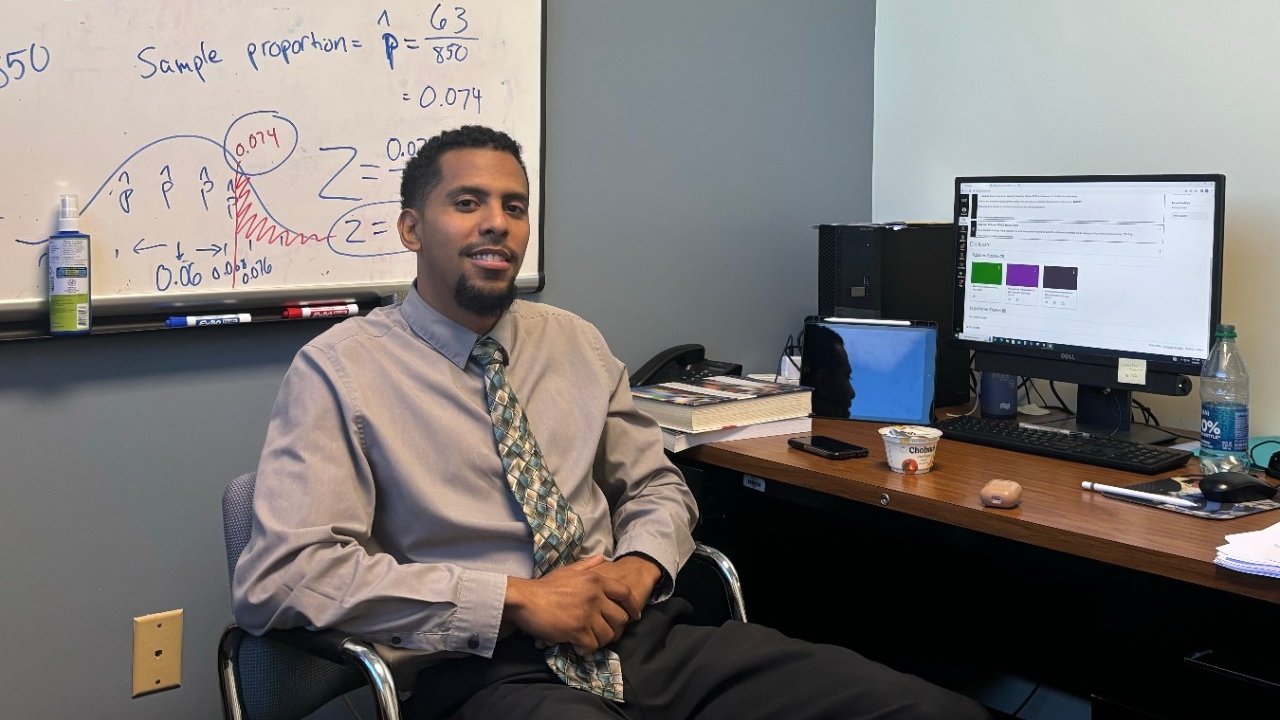
If the sight of a math problem strikes fear into your heart, David Evans understands your anxiety. Though he is currently a visiting lecturer in mathematics and statistics at Northern Kentucky University, the subject was a major source of struggle for Evans growing up, motivating him to instill confidence in students in his current role.
Evans’ family moved often when he was young, but his early aversion to math stems from his experiences as a fifth grader in California.
“The area we lived in was very racist—in some places, I’d experienced it subtly, but here there was explicit racism,” Evans says. “Up until that point, I’d done pretty well in my math classes, but my math teacher that year just kept giving me Fs. I’d study hard, do my homework and still get bad grades. He’d give me all these little comments about how he didn’t think math was for me and he’d always get me into trouble, even though I barely said anything in class.”
On one occasion, determined not to fail, he remembers being extra prepared for a test that was scheduled to take place the following day. When his teacher singled him and his friend out for talking, the two were forced to take their test a day early, with just 10 minutes remaining in class.
“That’s what I’m trying to focus on: helping students realize the great opportunity they have before they make things harder for themselves."
“He graded it in front of us and gave us Fs, and he told us, ‘This is all you’re worth,’” Evans says. “I didn’t completely understand at the time. I just knew that this teacher really didn’t like me, and my confidence in math was shot after that. Even after we moved to a different state, it just affected me forever. Even today, as a math teacher, I still don’t always have that confidence compared to others.”
When he eventually began attending college at the University of Cincinnati in 2002, Evans didn’t know exactly what he wanted to study, but he did have an interest in teaching—maybe history or social studies.
“However, my advisor asked, ‘Why don’t you try to do math? There aren’t many black, male math teachers.’ So, I switched to that, even though I didn’t have that confidence in math,” he says. “It initially caused me to struggle in most of my classes.”
After graduating, Evans decided that teaching high school wasn’t for him, but still had to figure out what to do with his math degree. While he was working at a rec center, a friend told him that Cincinnati State needed tutors.
“I went over there and mentioned my math degree and the lady I spoke to actually rang a cowbell and was, like, ‘Oh my God, we need you,’” says Evans. “The whole time, I was thinking, ‘Man, I hope I can even do this.’ I tutored for about a semester, and people seemed to think I was the smartest person. The dean of students heard about me from other students, and she called me into her office and asked if I was interested in teaching. Even though I didn’t have my master’s, I was able to take developmental classes to get around it."
This was in 2008, and Evans was still in his mid-twenties. Given Cincinnati State’s large number of adult learners, he was nervous about whether he would be able to connect with his classes—a fear that was quickly dispelled.
“A lot of my students would tell me how much it meant for someone like me to be in this kind of position,” he says. “In my own demographic, there were a lot of people who felt like they didn’t like math because they weren’t given a sense of confidence. Plus, I ended up getting confident in math myself through teaching. I didn’t truly believe I could do it until I helped others learn to work through problems.”
Still, Evans wanted to teach full time, but to achieve that goal, he had to go back to school. He earned his master’s in biostatistics in 2019 and applied to NKU, where he was hired to teach statistics the same year. Adjusting to instruction in a more traditional setting university has inspired him to be there for students who might need an extra motivational boost.
“At Cincinnati State, many of the students I worked with had originally struggled at larger universities because they weren’t ready for college or living on their own,” he says. ‘Now I have the opportunity to help those students before they mess up. I really don’t want that for them. That’s what I’m trying to focus on: helping students realize the great opportunity they have before they make things harder for themselves.”
When Evans was an undergraduate, he says that he wasn’t always aware of the resources available to him. At NKU, he feels that students feel much more connected to tools and opportunities like the First-Year Student Success Hub and Learning PLUS.
“Back then, I didn’t have a person to really connect me to that type of thing,” Evans says. “If you’re a student who’s more introverted, you need a bridge or a physical connection. I feel like here at NKU, we have a lot of that type of person who can point you toward those resources.”
When he’s not teaching, Evans enjoys travel. Most recently, he took his two children on a road trip to the west coast.
“It was a whole month-long road trip—we went to so many parks and camped out all the time. They flew back home and I drove back,” he says. “For me, traveling is number one on my list of hobbies.”